The Eagles (band), an emblematic American rock band, were formed in Los Angeles in 1971, setting the stage for what would become a defining act in the rock music genre. The band originated from the simple yet profound idea of bringing together talented artists from varying musical backgrounds. Founding members Glenn Frey, Don Henley, Bernie Leadon, and Randy Meisner were initially assembled as part of Linda Ronstadt’s backup band. This collaboration provided them with a unique musical chemistry that led to their eventual formation of The Eagles, spurred by their shared vision of creating a distinctive sound.
Their music, a rich tapestry of rock, country, and folk influences, quickly resonated with audiences, distinguishing them as pioneers of the burgeoning country rock genre in the 1970s. The Eagles’ sound was marked by lush harmonies and melodic fluency, which were brilliantly showcased in their debut album that featured hits like “Take It Easy” and “Witchy Woman.” These songs not only charted new musical territories but also established The Eagles as a major force in the American music scene.
The Eagles’ influence extended beyond their immediate musical output. Their ability to blend rock and roll with country elements forged a pathway for future bands and shaped the genre’s evolution. As their career progressed, their music grew in complexity and depth, culminating in the iconic album “Hotel California,” which remains a milestone in rock music for its thematic maturity and musical intricacy.
Through their compelling storytelling and innovative sound, The Eagles have left an indelible mark on the world of music. Their journey from backup musicians to rock superstars highlights their significant impact on the musical landscape, inspiring generations of musicians and fans alike. Their legacy, defined by timeless tracks and record-breaking sales, underscores their enduring influence and the universal appeal of their music.
| Feature | Details |
|---|---|
| Formation | The Eagles were formed in Los Angeles in 1971, originally as part of Linda Ronstadt’s backup band. |
| Founding Members | Glenn Frey, Don Henley, Bernie Leadon, Randy Meisner |
| Music Style | Combination of rock, country, and folk influences; pioneers of country rock genre in the 1970s. |
| Key Albums and Songs | Debut album with hits like “Take It Easy” and “Witchy Woman”, iconic album “Hotel California”. |
| Legacy | Influential in shaping the rock and country genres, known for lush harmonies and melodic fluency, enduring influence on music and artists. |
Contents
The Early Years (1971-1973)
The formation of The Eagles in 1971 marked the convergence of four musicians whose paths crossed serendipitously, setting the foundation for what would become one of the most influential bands in rock history. Glenn Frey, Don Henley, Bernie Leadon, and Randy Meisner came together through a combination of chance and design, initially as part of Linda Ronstadt’s backup band. Their meeting was no accident; each had migrated to Los Angeles to pursue musical careers, drawn by the burgeoning folk and rock scenes.
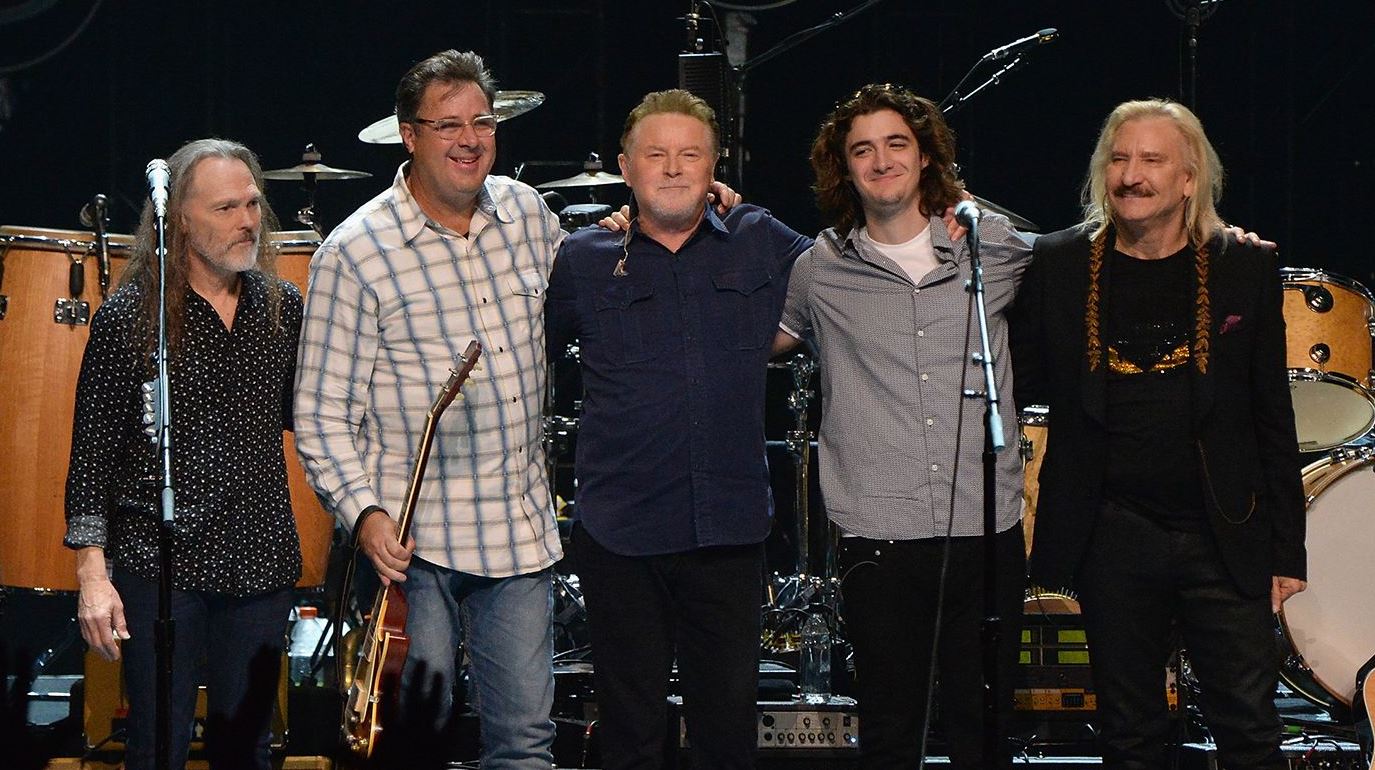
Frey and Henley first met at the Troubadour, a hub for aspiring musicians. Both were performing in separate bands but were quickly drawn together by their mutual aspirations and love for rock and country music. Leadon joined the pair next, bringing his experience from the Flying Burrito Brothers, while Meisner, who had played with Poco and Ricky Nelson’s Stone Canyon Band, completed the lineup. The quartet’s stint with Ronstadt was short but pivotal, giving them the experience and confidence needed to branch out.
Propelled by their collective vision, The Eagles signed with Asylum Records in September 1971. Their self-titled debut album, released in 1972, was a major success, featuring hits such as “Take It Easy” and “Witchy Woman.” These songs showcased their signature sound, a blend of rock and country, marked by tight harmonies and catchy melodies. “Take It Easy,” co-written by Frey and Jackson Browne, became an anthem of the laid-back Southern California lifestyle, while “Witchy Woman” added a touch of rock mystique, further diversifying their appeal.
| Aspect | Details |
|---|---|
| Formation | Formed in 1971 in Los Angeles, initially as part of Linda Ronstadt’s backup band. The band members were drawn to LA by the folk and rock scenes. |
| Founding Members | Glenn Frey, Don Henley, Bernie Leadon, Randy Meisner. Their collaboration began after Frey and Henley met at the Troubadour. |
| Early Influences | Frey and Henley were inspired by rock and country music, Leadon brought experience from the Flying Burrito Brothers, Meisner had played with Poco and Ricky Nelson’s band. |
| Record Signing | Signed with Asylum Records in September 1971. |
| Debut Album Success | Released in 1972, featuring hits like “Take It Easy” (co-written by Frey and Jackson Browne) and “Witchy Woman”, defining their rock and country blend. |
| Signature Sound | Characterized by tight harmonies and catchy melodies; “Take It Easy” embodied the Southern California lifestyle, while “Witchy Woman” added rock mystique. |
Rise to Fame (1973-1975)
The period from 1973 to 1975 was a transformative time for The Eagles, marked by a significant evolution in their musical style and a rise to international fame. This phase began with the addition of guitarist Don Felder in 1974, whose rock-oriented approach brought a new dimension to the band’s sound. Felder’s influence was immediately apparent in the album “On the Border,” where his electric guitar work added a harder rock edge to the Eagles’ music.
In 1973, The Eagles released “Desperado,” an album that, while only modestly successful at first, became revered for its bold conceptual nature and is considered a classic today. Songs like “Tequila Sunrise” and the title track “Desperado” showcased the band’s growing narrative depth and musical maturity. The album’s Old West outlaw theme resonated deeply, drawing parallels between the bandit lifestyle and the rock and roll life.
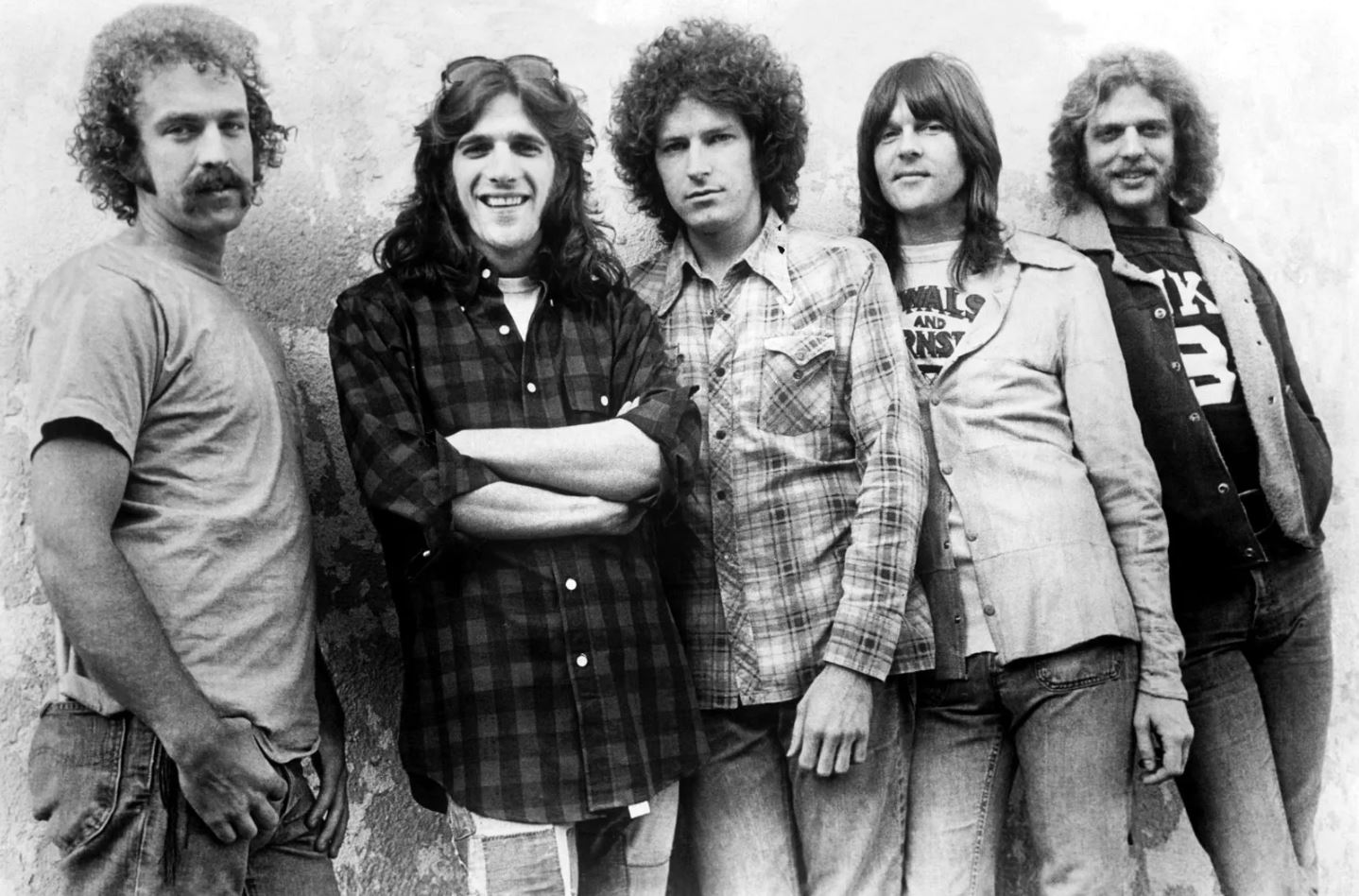
The following year’s “On the Border” further solidified their status in the rock world. The album featured the hit “Already Gone,” a rock anthem that became a staple at concerts, and “Best of My Love,” which became their first number-one single on the Billboard charts. These tracks exemplified the band’s ability to blend rock and country elements seamlessly, appealing to a broad audience and setting the stage for even greater success.
1975’s “One of These Nights” introduced a more polished sound and resulted in another chart-topping album. The title track, along with hits like “Lyin’ Eyes” and “Take It to the Limit,” showcased The Eagles’ ability to create songs that were both catchy and emotionally resonant. “Lyin’ Eyes,” in particular, won the band its first Grammy Award, reinforcing their place at the forefront of the American music scene.
During these formative years, The Eagles not only defined their sound but also set new standards for musical storytelling, with each album building on the last to expand their artistic landscape. Their progression from a country-influenced rock band to superstars of the rock world was marked by a series of bold artistic choices and a keen sense for the evolving tastes of their audience, paving the way for their continued success and influence in the music industry.
| Year | Album | Key Developments | Impact |
|---|---|---|---|
| 1973 | Desperado | Released with songs like “Tequila Sunrise” and “Desperado.” Conceptual album with an Old West outlaw theme. | Initially modest but later revered for narrative depth and musical maturity. Became considered a classic. |
| 1974 | On the Border | Addition of guitarist Don Felder, who introduced a harder rock edge. Included hits “Already Gone” and “Best of My Love.” | Marked the band’s rising international fame; “Best of My Love” became their first number-one Billboard hit. |
| 1975 | One of These Nights | Polished sound with tracks like “Lyin’ Eyes,” “Take It to the Limit,” and “One of These Nights.” | The album topped charts; “Lyin’ Eyes” won the band its first Grammy Award, cementing their superstar status. |
Peak Success (1975-1977)
The Eagles reached the pinnacle of their commercial success from 1975 to 1977, a period marked by significant musical evolution and the release of their most iconic album, “Hotel California.” The introduction of Joe Walsh in 1975 heralded this new era, bringing a rockier edge to the band’s sound. Walsh, a seasoned musician known for his work with the James Gang, replaced Bernie Leadon, who left due to musical differences. Walsh’s influence was pivotal, infusing the band’s country rock style with a harder, more electric-oriented rock sound.
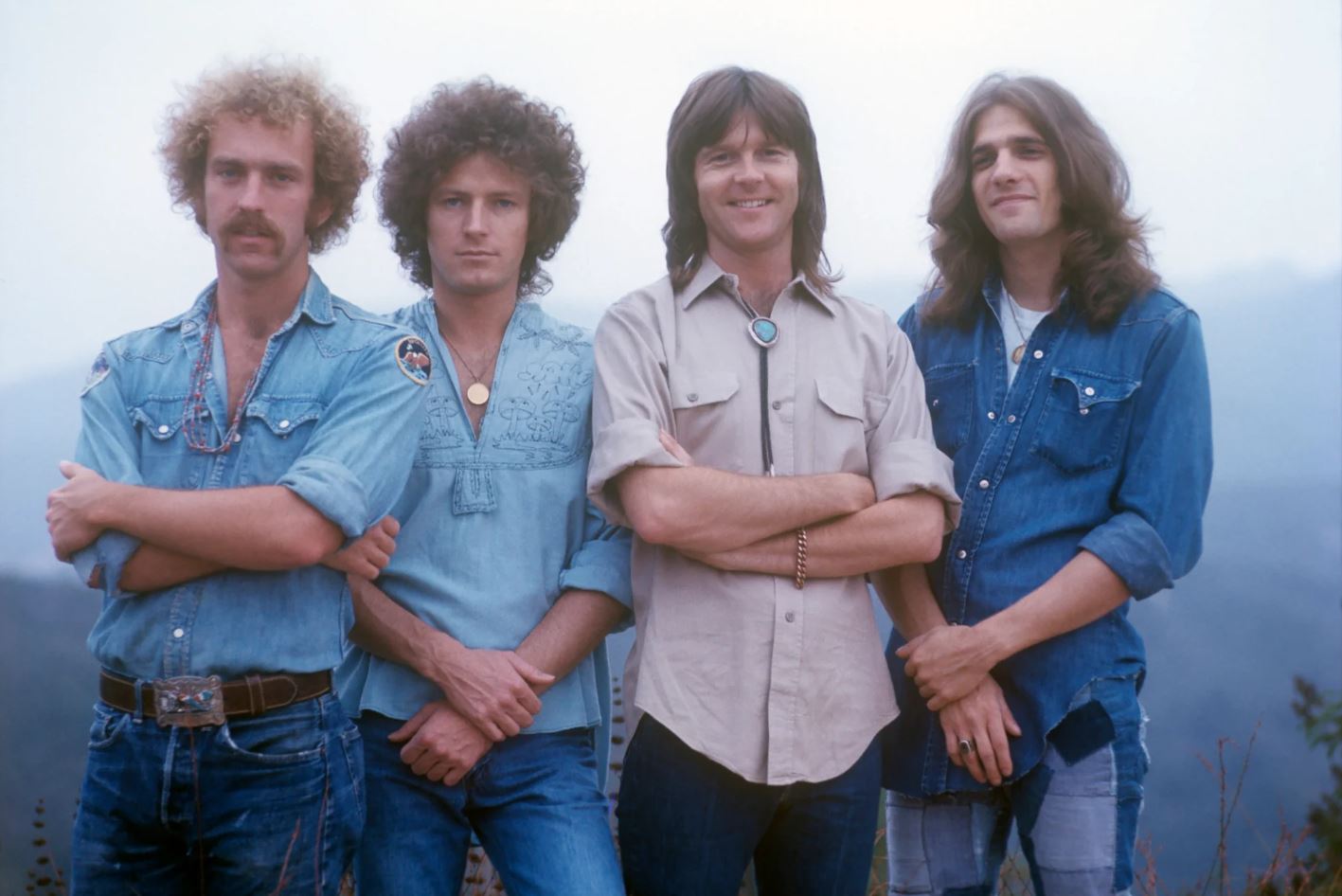
In December 1976, The Eagles released “Hotel California,” an album that became a global phenomenon and is often considered one of the greatest albums in rock history. It marked a departure from their earlier work, offering a darker, more introspective look at the American lifestyle through a blend of rock and roll and sharp storytelling. The title track, “Hotel California,” with its distinctive guitar riff and surreal lyrics, became an anthem of the era, capturing the imagination of listeners worldwide with its narrative of excess and disillusionment. The song’s extended guitar coda, played by Walsh and Don Felder, remains one of rock’s most memorable solos.
“New Kid in Town” was another major hit from the album, showcasing the band’s softer, more melodious side and addressing themes of fame and the transient nature of public adoration. Both “Hotel California” and “New Kid in Town” soared to number one on the charts, cementing the album’s place in music history.
| Year | Key Event | Details | Impact |
|---|---|---|---|
| 1975 | Introduction of Joe Walsh | Joe Walsh, known for his work with the James Gang, replaced Bernie Leadon, bringing a rockier edge to the band’s sound. | Infused the band’s country rock style with a harder, more electric rock sound, marking a new era in their musical evolution. |
| 1976 | Release of “Hotel California” | The album featured hits like “Hotel California” and “New Kid in Town.” Known for its darker themes and complex storytelling. | Became a global phenomenon and is considered one of the greatest albums in rock history. Both hits reached number one on the charts. |
| 1977 | Continued Success | “Hotel California” continued to dominate the charts and define the era, with the title track and “New Kid in Town” becoming anthems. | Solidified The Eagles’ status as rock superstars, with the album’s themes resonating deeply with the cultural zeitgeist. |
Challenges and Changes (1977-1980)
However, the success of “Hotel California” also brought challenges. As the band’s fame grew, so did the pressures and expectations. The departure of founding member Randy Meisner in 1977 was the first of several lineup changes that signaled internal conflicts within the band. Meisner was replaced by Timothy B. Schmit, formerly of the band Poco, who brought a new voice and dynamic to the group. This transition period was fraught with tension as the band struggled to balance their artistic aspirations with the demands of their increasing popularity.
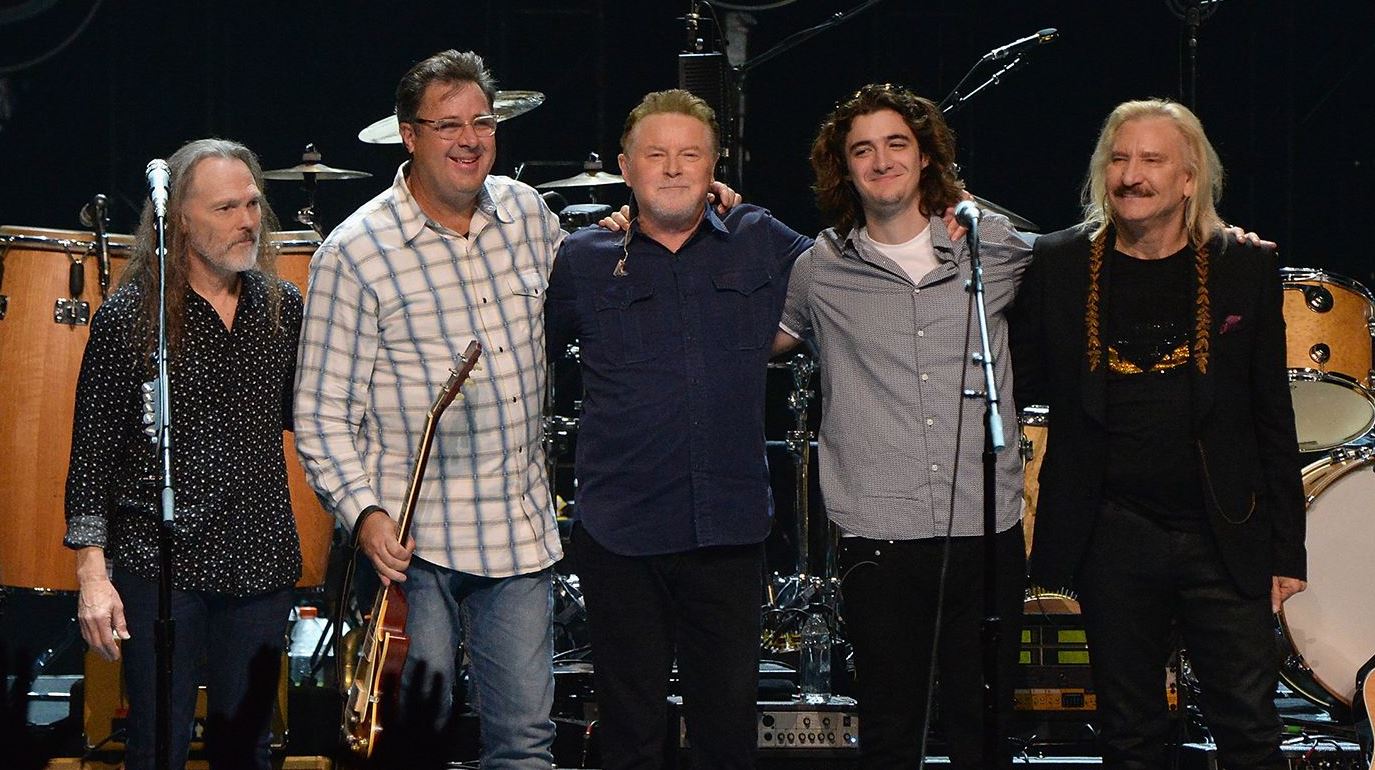
The recording of their next album, “The Long Run,” epitomized these challenges. Released in 1979, the album was initially conceived as a double album but was scaled back due to songwriting struggles and the band’s exhaustive perfectionism. “The Long Run” included hits like “Heartache Tonight,” which became their last single to top the charts, and the title track, which reflected the band’s fatigue and frustration with the music industry and their personal tribulations.
The making of “The Long Run” was a protracted and difficult process, taking nearly three years to complete. The band members’ relationships were strained by creative differences, legal disputes, and the physical and mental toll of their relentless recording schedule and tours. These internal conflicts, coupled with the stress of living up to the monumental success of “Hotel California,” culminated in the band’s decision to disband in 1980.
The initial breakup of The Eagles in 1980 marked the end of an era but not the end of their influence. Despite their personal and professional challenges, The Eagles left behind a legacy of groundbreaking music that continued to resonate with fans new and old. Their story from 1975 to 1980 is a testament to the highs and lows of rock stardom, capturing both the cultural zeitgeist and the personal hardships of life in the fast lane.
| Year | Event | Details | Impact |
|---|---|---|---|
| 1977 | Departure of Randy Meisner | Randy Meisner left the band and was replaced by Timothy B. Schmit, signaling the beginning of significant internal conflicts and lineup changes. | Introduced new dynamics to the band but marked the start of a challenging period due to increasing pressures and expectations. |
| 1979 | Release of “The Long Run” | Initially planned as a double album, scaled back to a single due to songwriting and recording struggles. Featured hits like “Heartache Tonight.” | Reflects the band’s fatigue and frustration with the music industry; marked their last chart-topping single before their initial breakup. |
| 1980 | Band Breakup | Due to ongoing internal conflicts and the toll of their lifestyle, The Eagles disbanded, ending an era of monumental success. | Marked a significant moment in rock history; despite the breakup, their musical legacy continued to influence and resonate. |
Solo Careers and Hiatus (1980-1994)
Following The Eagles’ disbandment in 1980, the individual members pursued successful solo careers, which allowed them to explore different musical avenues and further establish their individual identities outside the band. Don Henley achieved great success as a solo artist, with hits like “The Boys of Summer” and “Dirty Laundry,” which have become rock radio staples. His albums, notably Building the Perfect Beast and The End of the Innocence, not only sold well but also garnered critical acclaim, cementing his reputation as a thoughtful and politically engaged songwriter.
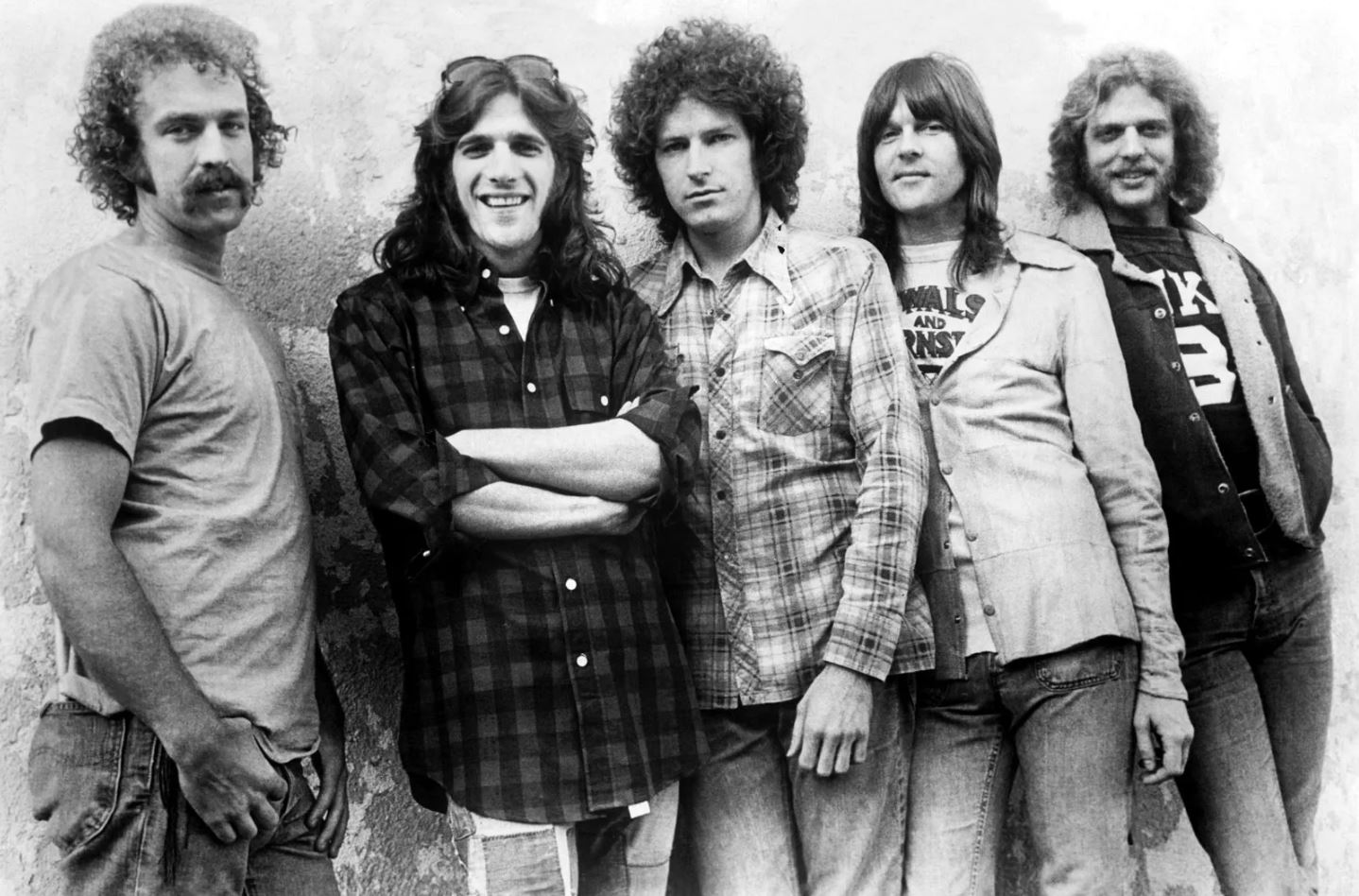
Glenn Frey also enjoyed success, embracing a slightly more rock-oriented sound, scoring hits with songs like “The Heat Is On” and “You Belong to the City.” His work featured prominently in popular 1980s television shows and movies, notably “Miami Vice,” which helped define the sound and aesthetic of the era. Joe Walsh, known for his distinctive guitar playing and quirky personality, continued his solo career with albums like There Goes the Neighborhood and also collaborated with other artists, contributing to the richness of the rock genre during the 80s.
These solo projects not only highlighted the members’ individual talents but also kept the spirit of The Eagles alive in popular culture. Their individual successes demonstrated the enduring appeal of the band’s music and laid the groundwork for their eventual reunion.
| Member | Key Achievements | Impact |
|---|---|---|
| Don Henley | Successful solo albums like “Building the Perfect Beast” and “The End of the Innocence.” Hits include “The Boys of Summer” and “Dirty Laundry.” | Cemented his reputation as a thoughtful songwriter; his music remained politically engaged and critically acclaimed. |
| Glenn Frey | Enjoyed hits like “The Heat Is On” and “You Belong to the City.” His music featured in “Miami Vice.” | Defined the sound and aesthetic of the 1980s, blending rock with cinematic and television landscapes. |
| Joe Walsh | Released albums like “There Goes the Neighborhood” and continued his solo career. Noted for his distinctive guitar style and collaborations. | Contributed to the richness of the rock genre during the 80s; maintained a unique presence in the music industry with his quirky personality. |
Reunion and Later Years (1994-Present)
The Eagles reunited in 1994 for the live album Hell Freezes Over, a mix of live performances and new studio tracks. The title of the album humorously referred to Henley’s previous statement that the band would play together again “when hell freezes over,” acknowledging the perceived improbability of their reunion. The album debuted at No. 1 on the Billboard charts, driven by the singles “Get Over It” and “Love Will Keep Us Alive,” proving that the band still had significant drawing power. The accompanying tour was highly successful, featuring a mix of old hits and new songs, and it reestablished The Eagles as a major live act.
Since the reunion, The Eagles have continued to tour extensively, adapting to changes in the music industry and audience expectations. The digital age brought new challenges and opportunities, with the band choosing strategic releases and partnerships, such as exclusive deals with online platforms and special editions for retail chains, to reach their audience.
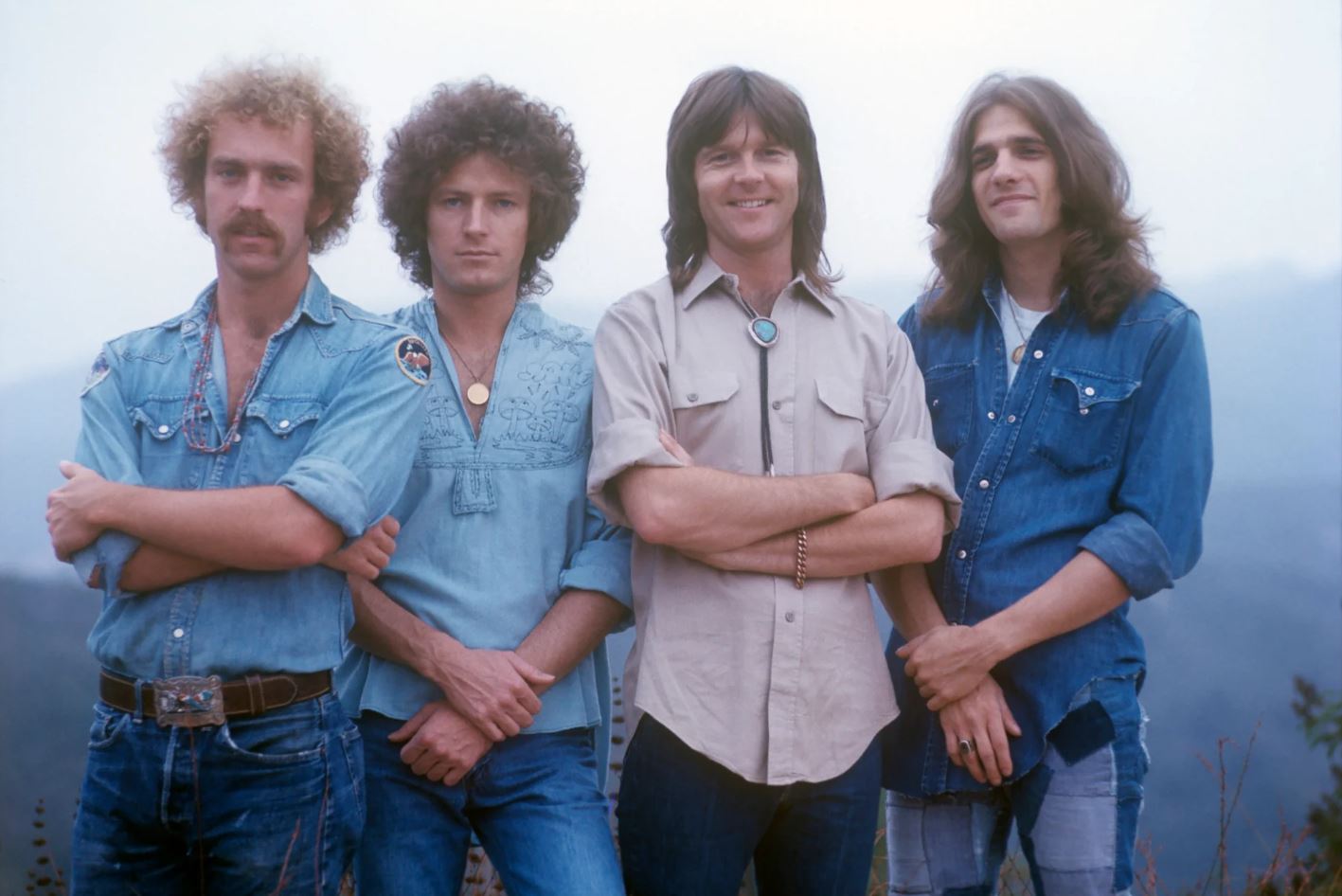
Significant changes in the lineup occurred following the death of Glenn Frey in 2016. His son, Deacon Frey, and country musician Vince Gill were brought in to share lead vocals for Frey’s songs. This infusion of new blood has allowed The Eagles to continue touring and maintain a connection with their past while looking forward. Deacon Frey’s presence has been particularly poignant, providing a tangible link to Glenn Frey and helping to bridge the gap between the generations of Eagles fans.
The band’s ability to adapt over time—whether through embracing new musical styles, navigating the shifts in the music business, or responding to personal changes within the group—has ensured their continued relevance and success. From their formation in the early 1970s to their current tours, The Eagles have remained a powerful force in rock music, demonstrating an enduring appeal that transcends generations.
These later years have not only underscored The Eagles’ adaptability but have also highlighted their enduring influence on rock and roll. Their story is a testament to the lasting power of great music and the deep connection it can forge with audiences worldwide.
| Year/Period | Event | Details | Impact |
|---|---|---|---|
| 1994 | Reunion and “Hell Freezes Over” | Live album mix of live performances and new studio tracks. Included singles “Get Over It” and “Love Will Keep Us Alive.” | Album debuted at No. 1 on Billboard, signaling strong fan support and commercial viability. Marked the band’s return as a major live act. |
| Post-1994 | Continued Tours | Extensive touring adapting to the digital age with strategic releases and partnerships, maintaining relevance in changing music industry landscapes. | Reestablished and solidified their status as a premier live band in the rock genre. |
| 2016 | Lineup Changes | Following Glenn Frey’s death, his son Deacon Frey and country musician Vince Gill joined to share lead vocals for Frey’s songs. | Helped the band maintain continuity and a connection to their past while refreshing their lineup for newer audiences. |
Legacy and Influence
The Eagles’ impact on the music industry is indelibly marked by their induction into the Rock and Roll Hall of Fame in 1998. This prestigious honor recognized not only their musical achievements but also their profound influence on the rock genre. The ceremony celebrated their extraordinary contributions and the enduring appeal of their music, which has resonated with multiple generations of fans.
In terms of sales achievements, The Eagles have set and broken records that underscore their massive appeal. Their greatest hits album, “Their Greatest Hits (1971–1975),” has been certified 38 times platinum, making it one of the best-selling albums in U.S. history. This compilation alone speaks volumes about their popularity and the timeless quality of their music. Additionally, the “Hotel California” album has sold over 26 million copies, further cementing its status as one of the all-time greats in the music industry.
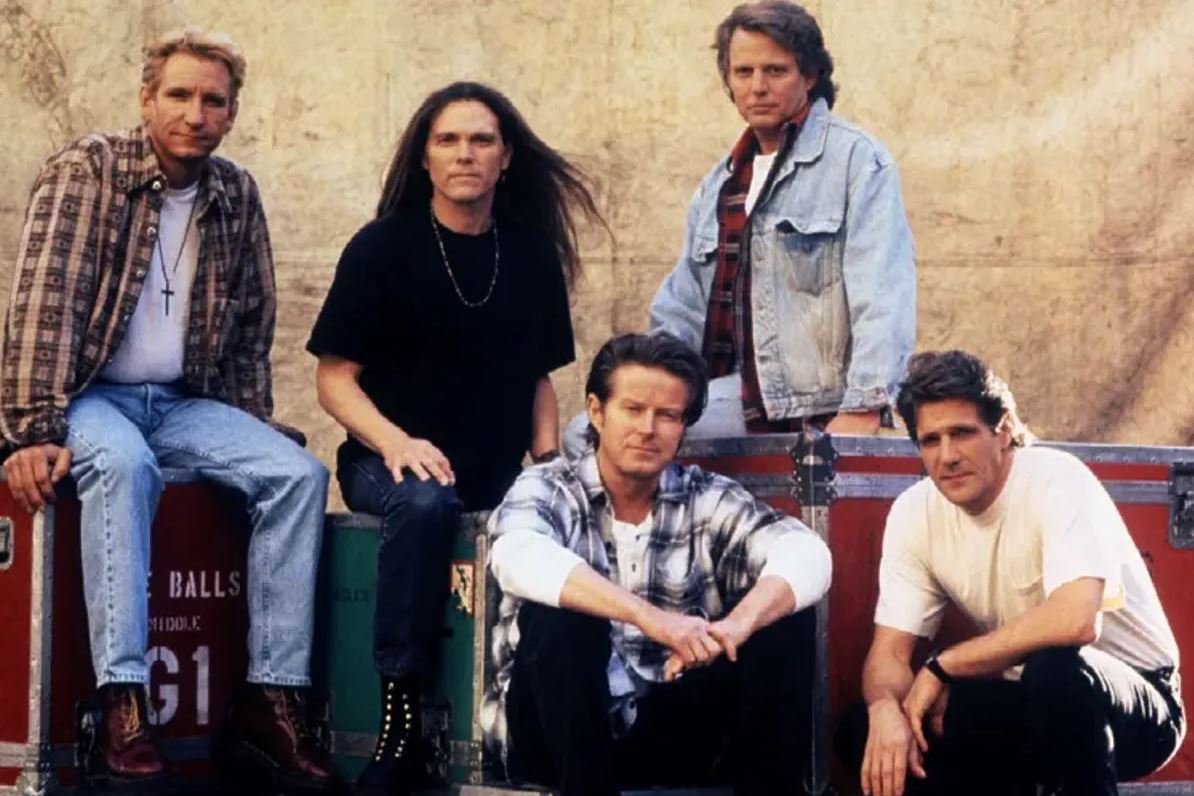
The influence of The Eagles extends far beyond their sales figures. They have left a lasting mark on countless artists and bands. Their harmonious blend of rock, country, and folk elements has been a blueprint for many musicians, inspiring genres from soft rock to more modern country music. Bands and artists across different genres often cite The Eagles as a key influence in their own musical development. Their intricate harmonies, meticulous songwriting, and the ability to craft songs with emotional depth continue to inspire musicians around the world.
| Year/Event | Details | Impact |
|---|---|---|
| 1998 | Induction into the Rock and Roll Hall of Fame | Recognized their musical achievements and profound influence on the rock genre; celebrated their contributions to music. |
| Sales Achievements | “Their Greatest Hits (1971–1975)” certified 38 times platinum; “Hotel California” sold over 26 million copies. | Underlines their massive appeal; ranks them among the top-selling artists in U.S. history. |
| Influence on Music | Their blend of rock, country, and folk has influenced multiple genres and generations of musicians. | Acts as a blueprint for many artists, inspiring the evolution of genres from soft rock to modern country music. |
The enduring legacy of The Eagles in rock music is characterized by their timeless sound, profound lyrical narratives, and exceptional musicianship. Since their formation in the early 1970s, they have not only defined a genre but also set the standards for musical excellence and commercial success in the industry. Even decades later, their songs receive regular airplay on radio stations and continue to be featured in movies, television shows, and commercials, attesting to their lasting appeal and relevance.
Their music speaks to universal themes of love, loss, and redemption, which transcend the era in which they were written, making them relevant to new audiences as time passes. The Eagles’ ability to evolve while staying true to their artistic vision has allowed them to remain a vital force in the music industry. Their concerts still draw large crowds, filled with both longtime fans and newer generations eager to experience their legendary sound live.
In essence, The Eagles have not just survived the changing landscapes of rock music; they have thrived, continuing to influence the fabric of music with their rich legacy. As they continue to tour and share their music with the world, The Eagles remain a testament to the enduring power of great music to connect, inspire, and endure. Their journey from a young band out of Los Angeles to one of the most iconic and revered names in rock history is a compelling narrative of artistic perseverance and enduring popularity.

